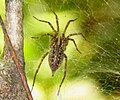Agelenopsis
| American grass spiders | |
|---|---|

| |
| Agelenopsis cf. pennsylvanica in Vernon, British Columbia | |

| |
| Agelenopsis pennsylvanica in web, from Pocahontas State Park, Chesterfield, Virginia | |
| Scientific classification | |
| Domain: | Eukaryota |
| Kingdom: | Animalia |
| Phylum: | Arthropoda |
| Subphylum: | Chelicerata |
| Class: | Arachnida |
| Order: | Araneae |
| Infraorder: | Araneomorphae |
| Family: | Agelenidae |
| Genus: | Agelenopsis Giebel, 1869 |
| Type species | |
| A. potteri (Blackwall, 1846) | |
| Species | |
|
14, see text | |
Agelenopsis, commonly known as the American grass spiders, is a genus of funnel weavers first described by C.G. Giebel in 1869.[1] They weave sheet webs that have a funnel shelter on one edge. The web is not sticky, but these spiders make up for that shortcoming by running very rapidly. The larger specimens (depending on species) can grow to about 19 mm in body length. They may be recognized by the arrangement of their eight eyes into three rows. The top row has two eyes, the middle row has four eyes, and the bottom row has two eyes (spaced wider than the ones on the top row). They have two prominent hind spinnerets, somewhat indistinct bands on their legs, and two dark bands running down either side of the cephalothorax.
Name
The genus name is a combination of Agelena (Eurasian grass spiders), a genus of similar spiders, and Greek -opsis "to look like". They are harmless spiders. Although most spiders use their webs to catch prey, the grass spider's web lacks adhesive ability. The spiders make up for that with their fast running.
The main distinction between Agelenopsis and the related European genus Agelena consists of the pattern appearing on the cephalothorax; the former possesses two quasiparallel lines from the eyes to the beginning of the abdomen. The latter genus has curved, irregular lines that often meet at the end. Another difference is the length of the front legs row in females, but in males, the comparison is too inconsiderable.
Species
As of April 2019[update] it contains fourteen species:[2]
- Agelenopsis actuosa (Gertsch & Ivie, 1936) – common American grass spider - USA, Canada
- Agelenopsis aleenae (Chamberlin & Ivie, 1935) – USA
- Agelenopsis aperta (Gertsch, 1934) – desert grass spider - USA, Mexico
- Agelenopsis emertoni (Chamberlin & Ivie, 1935) – USA
- Agelenopsis kastoni (Chamberlin & Ivie, 1941) – USA
- Agelenopsis longistyla (Banks, 1901) – USA
- Agelenopsis naevia (Walckenaer, 1841) – USA, Canada
- Agelenopsis oklahoma (Gertsch, 1936) – USA, Canada
- Agelenopsis oregonensis (Chamberlin & Ivie, 1935) – USA, Canada
- Agelenopsis pennsylvanica (C. L. Koch, 1843) – USA, Canada
- Agelenopsis potteri (Blackwall, 1846) – North America. Introduced to Ukraine, Russia (Europe, Far East), Kirgizstan
- Agelenopsis riechertae (Bosco & Chuang, 2018) – USA
- Agelenopsis spatula (Chamberlin & Ivie, 1935) – USA
- Agelenopsis utahana (Chamberlin & Ivie, 1933) – USA, Canada
Gallery
-
Agelenopsis sp. male, 17 mm (about ¾ inch)
-
Same, showing elaborate pedipalps
-
Same, from the side
-
Agelenopsis sp. showing pronounced leg spines
-
Agelenopsis in its web
-
Agelenopsis in web built on grass, with prey
-
A. pennsylvanica female in web
See also
References
- ^ Giebel, C. G. (1869). "Über einige Spinnen aus Illinois". Zeitschrift für die Gesammten Naturwissenschaften. 33: 248–253.
- ^ "Gen. Agelenopsis Giebel, 1869". World Spider Catalog. Natural History Museum Bern. Retrieved 2019-04-16.
External links
- Agelenidae species
- Pictures of Agelenopsis sp. (free for noncommercial use)
- Diagnostic Photos and information, Agelenopsis sp.
- Common Spiders in California, Agelenopsis sp.
- Bradley, Richard A. (2012). "Grass Spider" (PDF). Common Spiders of Ohio. Ohio Division of Wildlife. p. 14.







